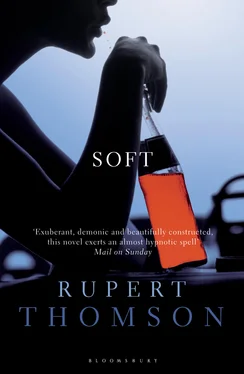He turned round, looked both ways. No cars, no people. He took Glade by the arm.
‘We’re climbing over,’ he said. ‘Both of us.’
Her eyes moved towards the railing. ‘Over?’
He nodded.
She wasn’t sure that she could do it. Her skirt, she said. Her shoes. He would help her, he said. He would thread his fingers, make a step. Then he would lift her. He told her not to worry. He’d be there.
‘I used to climb trees when I was young,’ she said doubtfully.
‘This is the same thing,’ he said. ‘The same thing exactly.’ Glancing one way, then the other. Still no cars.
He kneeled. She placed a foot on his two hands and took hold of the railing. He caught a glimpse of the crease behind her knees, the long curve of a thigh. He almost gave up then. It would have been a kind of weakness, though. It wouldn’t have done her any good. They had reached their destination. There was nowhere else to go.
Still, he felt something collapse inside him, as if all the air had been drawn out of his body. I never want another day like this. Shaking his head, he smiled grimly. Everything he thought of now amused him. Who would he be remembered by? The man at the ticket counter? That woman on the tube? Would the Indian waiter remember him? Would anyone? His last moments lay in the hands of strangers.
A voice called out to him and he looked up. Glade was half-sitting, half-lying on the top of the railing. She clung on with her hands and knees, almost as if she was riding a horse bareback.
‘It’s windy up here,’ she said. ‘It’s very windy.’
‘I’m coming,’ he said.
He hoisted himself over the railing, feeling for the ledge with the toe of one boot. The metal was cold. He felt it bite into his fingers. The wind pushed at him with such force that he imagined, for a moment, that he was trapped in a crowd.
Then he was on the other side and reaching up for her. She slithered backwards, feet first, hair whipping into his eyes. Somehow he managed to guide her down, gather her in …
They were facing outwards now, into the dark. Their backs to the railing, their hands gripping the bars.
Wind filled his mouth each time he tried to speak.
He thought he heard a car go past. He couldn’t feel it in the metal of the bridge, though. It didn’t register. The sound of the engine blended with the wind.
If it was a car, it didn’t see them. Didn’t stop.
He tried to concentrate on the horizon, but sometimes there was a movement in the corner of his eye, a slow, blind movement, like some great creature turning in its sleep. The body of the river. Currents twisting ninety-eight feet down.
‘Are you afraid?’ he heard her say.
He looked into her face. Her pupils black, with discs of silver in the middle. Her hair blown back behind her shoulder, flattening against the pale metal of the railing. He thought of sticks washed by flood-water on to a drain and stranded there. He thought of stubborn things.
‘No,’ he said.
‘You look afraid.’
He attempted a grin. ‘What about you?’
‘No,’ she said. ‘I’m just cold, that’s all.’
‘These have been anxious days,’ Raleigh Connor said, ‘anxious days for all of us.’ He paced in front of the window, his shoulders rounded, his hands pushed deep into his trouser pockets. ‘However,’ and he turned back into the room and smiled, ‘I’m delighted to be able to inform you that our troubles are over …’
Positioned at the head of the table, he seemed to be waiting for some kind of response. A spontaneous burst of applause, perhaps, or murmurs of appreciation. At the very least he must have expected to see his smile mirrored in the faces of his employees. But all Jimmy sensed was a subtle slackening of tension in the room, a kind of exhalation. He glanced at Neil and Debbie. They had been meeting in secret ever since the first threat of a leak halfway through July. They had been working sixty-hour weeks for almost two months. Quite possibly they were too exhausted to react. Still, someone had to say something.
‘That’s great news,’ Jimmy said. ‘Great news.’
But Debbie was frowning. ‘Can you give us any details?’
‘I prefer not to, Debbie.’
Connor’s voice did not invite further questioning. But this was a nuance which Debbie, as usual, failed to register.
‘You don’t think we’ve got a right to know?’ she said.
Connor’s lips tightened. ‘A right?’ he said, easing down into his chair. ‘No. This is not a matter of rights. This is a matter of what’s appropriate.’ He leaned his forearms on the table; his fingers calmly formed a pyramid. ‘All you need to know is what I’ve told you. There will be no scandal, no exposé. I’ve seen to that personally. To put it somewhat bluntly,’ and he paused, ‘we got away with it.’ His head rolled on his shoulders. His eyelids lowered a fraction as his gaze fixed on Neil Bowes. ‘Or, as your famous playwright said, “All’s well that ends well”.’
A sickly smile from Neil. No Chinese proverb, though. Not this time.
‘Obviously we won’t be resurrecting Project Secretary,’ Connor went on, turning to Jimmy. ‘It would be tempting fate. In any case, it’s my firm belief that it has already served its purpose, that of helping to establish Kwench! as a real power in the marketplace.’
Jimmy nodded in agreement.
‘Tomorrow morning,’ Connor said, ‘I’ll be holding a press conference. There are one or two important announcements I’d like to make. Also, I think it’s time to put an end to the rumours, once and for all.’ He slipped a sheaf of papers into his attaché case and snapped the brass locks shut. ‘And now, if you’ll excuse me …’
‘A double espresso,’ Jimmy said, ‘that’s what I need.’
He was standing outside the lift with Neil and Debbie. After their meetings with Connor they would usually sit in the café round the corner and hold a brief post-mortem; the name of the café — Froth — provided the perfect ironic counterpoint to their tense discussions.
‘Me too,’ Neil said.
Debbie didn’t say anything, but when the doors opened she followed them into the lift. She stood as far away from Jimmy as she could, with her arms folded. Ever since she learned that Project Secretary had been Jimmy’s idea, she had treated him the way you might treat a suitcase that’s been abandoned at an airport. Sometimes she looked at him so warily that he had the feeling he might actually explode. He pressed G for Ground. The doors slid shut.
‘Well,’ he said with a sigh, ‘it’s a relief, I suppose.’
‘If it’s true,’ Neil said.
‘What about these announcements?’ Debbie said.
‘Don’t know about you two,’ Jimmy said, ‘but it’s a big promotion for me.’
Neil’s head swung round. ‘Really?’
Jimmy laughed.
‘Fuck you, Jimmy,’ Neil said gloomily.
‘What did you think of the Shakespeare?’ Jimmy said.
Debbie eyed him from the corner of the lift.
‘What about it?’ Neil said.
‘All’s well that ends well,’ Jimmy said. ‘Shakespeare didn’t say that. He wrote it. It’s the title of a play, for Christ’s sake.’
‘Not his special subject,’ Debbie said. And then, with a faint sneer, ‘Not his field of expertise.’
Neil watched the numbers declining as if they told of his own personal downfall. ‘So what is?’
‘I think we all know the answer to that one,’ Debbie said.
‘Do we?’ Neil said.
That evening Jimmy parked his car on Mornington Terrace and walked north, following the wall that separates the road from the railway cut. He had always been struck by the colour of the bricks, an unusual purple-grey, and the subtle sheen they had, the kind of iridescence that you find on coal. From behind the wall came the clink and rattle of trains picking their way over sets of points. He was thinking about the lunch he’d had with Richard Herring. When their coffee arrived, Richard had leaned over the table with that serious look he would sometimes, and rather self-consciously, adopt. ‘There have been some stories going round,’ he said. ‘About your company.’
Читать дальше












